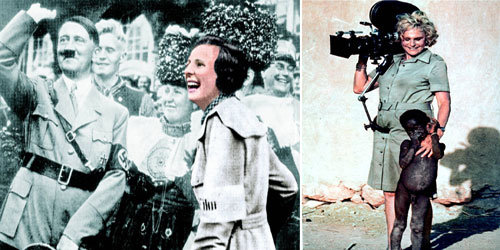Hitlers Leni

She always wore white clothes. She stood out wherever she was. Passionate and confident, she was queenly and arrogant in nature.
Many people loved her. She had masters in the palm of her hand using her gorgeous appearance. Joseph Goebbels wrote in his journal, Her work smells dubious
German women at that time had to be satisfied with 3Ks: child (Kinder), church (Kirche), and kitchen (K¨uche). However, she was an exception. She was the only woman who was allowed to pass through the thick wall of guards surrounding Hitler even without an appointment.
Like Hitler, she loved myth.
When the war came to an end at last, those who supported Hitler disappeared in the blink of an eye, but she shouted in the court:
I believed in Hitler. Do as you like! Kill me!
A Portrait of Leni Riefenstahl (1996) tells the life story of Leni Riefenstahl who lived the 20th Century, a century of extremes, with a forbidden passion. It is a portrait of the sad life of a woman who was a promising dancer, glamorous actress, and a genius director of the 20th Century, but who will be remembered as the director who glorified the evil that was Adolf Hitlers Germany.
Film critics groaned in agony, What can we think of this lyricism that came from the enemy of lyricism?
Were Riefenstahls movies really propagandas of Hitlers evil empire? Susan Sontag, who described her life as that of gloomy passion, gave the name fascist aesthetics to her documentaries in which she admired body and the rebirth of community through the worship of leader as well as of the beauty of human body.
Riefenstahl was judged, There was no crime to punish her for, in the court after the war. However, she was condemned to be lonely. Put on an unofficial blacklist, she could never make a movie again.
In part, she invited such a cruel fate. Riefenstahls presence was so gaudy that it was like a fascist evil spirit came to life when she appeared. While there was a fierce demonstration to condemn her outside, she used to appear in the court with her enchanting charm emphasized by 15cm high heel and a sensual riding habit that revealed her body line.
A modest opinion about her was impossible from the beginning. She was horrible or great, a devil or a genius.
She was politically naïve. No, she was an idiot. Having followed her life with deep compassion for her and human weakness, the writer asks to himself:
Wasnt political naivety the highest crime in the age of raging fascism?
- Original Title : A Portrait of Leni Riefenstahl(1996)
Gi-U Lee keywoo@donga.com







